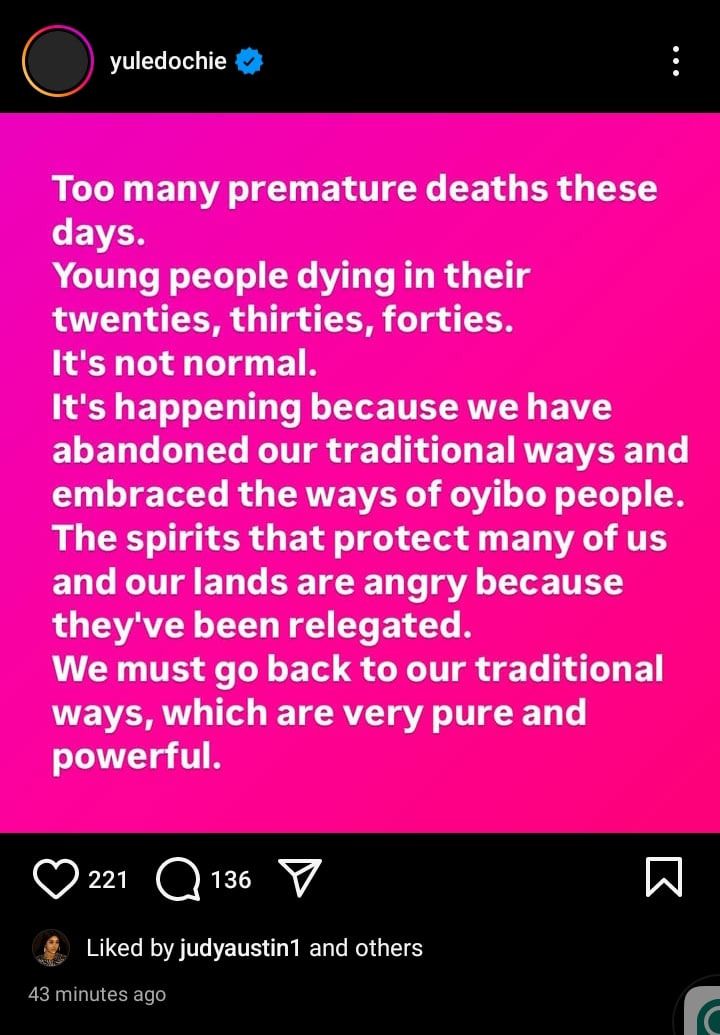In a thought-provoking social media statement that has sparked widespread discussion across Nigeria’s entertainment landscape, prominent Nollywood actor Yul Edochie has attributed the increasing rate of premature deaths among young people to what he describes as a widespread abandonment of traditional spiritual practices.
The veteran actor, known for his bold perspectives on cultural and social issues, expressed deep concern over what he perceives as an alarming trend of deaths among individuals in their twenties, thirties, and forties. Taking to his Instagram platform, Edochie shared his views with his substantial following, suggesting that the adoption of Western cultural practices at the expense of indigenous traditions has spiritual consequences.
The spirits that protect many of us and our lands are angry because they have been relegated,” Edochie declared, pointing to what he believes is a direct correlation between cultural shifts and mortality rates. The actor’s statement reflects a broader ongoing debate in Nigerian society about the balance between modernization and cultural preservation.
Edochie’s perspective touches on a sensitive intersection of traditional African spirituality and contemporary religious practices. His call for a return to “traditional ways, which are very pure and powerful” has generated mixed reactions among his followers and fellow industry figures. The statement comes at a time when Nigeria, like many African nations, continues to grapple with questions of cultural identity and spiritual heritage in an increasingly globalized world.
The actor’s message appears particularly poignant given his recent public appearances and statements about love and forgiveness. In previous social media posts, Edochie has emphasized the importance of cherishing life’s moments and fostering positive relationships. His message about premature deaths is interwoven with a broader philosophical outlook on life’s temporality and the significance of human connections.
This latest commentary adds another layer to Edochie’s public persona, which has evolved significantly in recent years. The father of five has maintained a visible presence in Nigerian media, not only for his acting career but also for his outspoken views on social issues and his previous presidential aspirations. His recent public displays of affection with his second wife, Judy Austin, have also kept him in the public eye, though these personal developments have sometimes overshadowed his cultural commentary.
The actor’s concerns about premature deaths resonate with ongoing discussions about public health and wellness in Nigeria. While Edochie approaches the issue from a spiritual and cultural perspective, his observations touch upon real demographic challenges facing the nation’s young population. His statement has sparked conversations about the role of traditional values and practices in contemporary Nigerian society.
Edochie’s message goes beyond mere cultural nostalgia, suggesting a deeper concern about the spiritual and social welfare of younger generations. His emphasis on the power of indigenous traditions reflects a growing movement among some African intellectuals and cultural figures who advocate for a reassessment of traditional knowledge systems and their potential relevance to modern challenges.
The timing of Edochie’s statement is particularly significant given the current global discussions about cultural identity, decolonization, and the preservation of indigenous knowledge systems. His perspective adds to the ongoing dialogue about how African societies can navigate between traditional values and modern realities while addressing contemporary challenges.
As discussions continue about the intersection of tradition and modernity in Nigerian society, Edochie’s comments have contributed to a broader conversation about cultural preservation, spiritual well-being, and public health. Whether or not one agrees with his spiritual interpretation of current mortality trends, his statement has successfully drawn attention to important questions about cultural identity and social well-being in contemporary Africa.
The actor’s message, while controversial for some, has succeeded in sparking meaningful dialogue about the role of traditional practices in modern African society and their potential impact on community well-being. As Nigeria continues to evolve and face new challenges, voices like Edochie’s ensure that questions of cultural heritage and spiritual well-being remain part of the national conversation.



